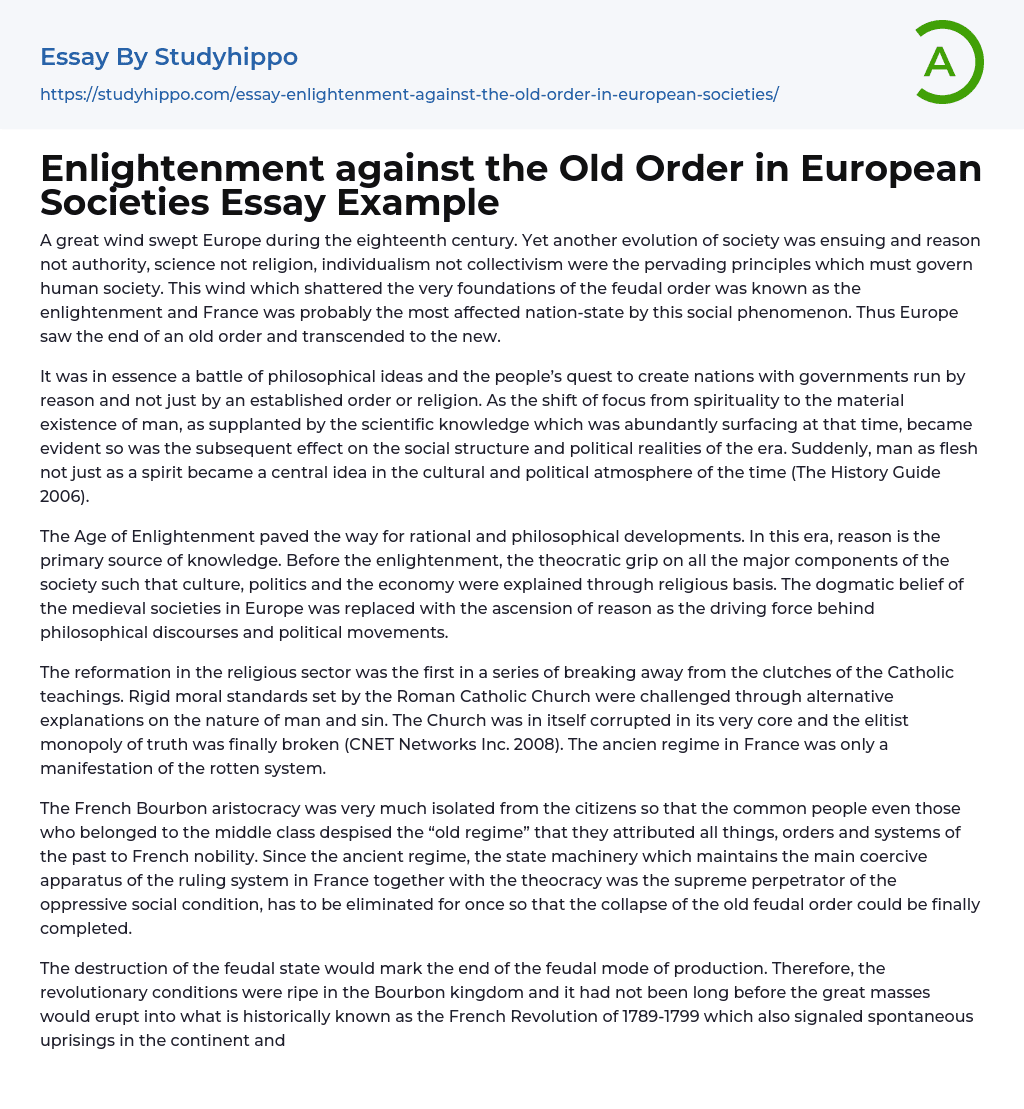

Enlightenment against the Old Order in European Societies Essay Example
Europe experienced a noteworthy transformation known as the Enlightenment, marked by the rise of reason, science, and individualism. This change greatly influenced France, leading to the decline of feudalism and the emergence of something novel.
The History Guide (2006) examines a period in history where there was a discussion about the merits of rational governments versus those rooted in tradition and religion. This shift, influenced by scientific understanding, had notable impacts on social structure and politics. At this time, the concept of humans being both physical and spiritual became increasingly significant in cultural and political contexts.
The Age of Enlightenment brought about rational and philosophical advancements as reason became the main source of knowledge. Prior to this period, society was largely controlled by theocracy, with religious explanations dom
...inating culture, politics, and the economy. However, with the emergence of reason, the dogmatic beliefs held by medieval European societies were replaced, and reason took on a central role in philosophical discussions and political movements.
The reformation in the religious sector marked the beginning of a series of departures from Catholic teachings. Alternative explanations about human nature and sin challenged the rigid moral standards imposed by the Roman Catholic Church. The Church itself was corrupt at its core, and the exclusive control over truth by the elite was finally shattered (CNET Networks Inc. 2008). The corrupt system in France was just one example of the broader problem.
The French Bourbon aristocracy was widely disconnected from the citizens, leading to contempt for the "old regime" even among those in the middle class. This disdain mainly targeted the French noble class as they wer
seen as responsible for all aspects of the past, such as systems and orders. To fully dismantle the old feudal system, it was crucial to remove the oppressive social conditions enforced by the state machinery, which served as the primary coercive force. Furthermore, there was a requirement to overthrow theocracy that had ruled France since ancient times.
The feudal mode of production ended with the destruction of the feudal state, marking a significant change. This allowed for revolution in the Bourbon kingdom, leading to the French Revolution of 1789-1799. The revolution also sparked rebellions in other countries and led to the creation of a parliament representing the bourgeoisie (Project Gutenberg 2005). The French Revolution was fueled by new ideas about equality, fraternity, and liberty that emerged from philosophy, science, and politics.
The revolutionaries demanded equality, as social inequality was evident in the concentration of land ownership among a few wealthy individuals. Alongside economic deprivation, there was also political oppression, with the toiling masses being unrepresented in government, which was dominated by the landed nobility. Fraternity served as the rallying cry to unite the progressive forces in French society and overthrow the oppressive Bourbon dynasty and Catholic clergy.
The French Revolution was essentially a conflict between the feudal class and the bourgeoisie regarding control of the economic system. The French population, who had long endured suffering at the hands of feudal lords, sided with the bourgeoisie despite knowing that oppression would persist under their rule. The bourgeoisie aimed to establish a liberal-democratic state, which would uphold the newly established order (The Victorian Web 2007).
The revolution resulted in a bitter power struggle,
leading to armed confrontations between the bourgeoisies fighting for territory control for their market. This eventually sparked the Napoleonic Wars, which marked the end of feudal domination and the start of capitalist aggression for labor power, raw materials, and market expansion.
- Acceptance essays
- Age Of Enlightenment essays
- Child Observation essays
- Confucianism essays
- Conscience essays
- Critical Reflection essays
- Destiny essays
- Determinism essays
- Empiricism essays
- Environmentalism essays
- Epistemology essays
- Ethics essays
- Ethos essays
- Existence essays
- Existentialism essays
- Fate essays
- Free Will essays
- Functionalism essays
- Future essays
- Good And Evil essays
- Human Nature essays
- Individualism essays
- Meaning Of Life essays
- Metaphysics essays
- Natural Law essays
- Personal Philosophy essays
- Philosophers essays
- Philosophy Of Life essays
- Political Philosophy essays
- Pragmatism essays
- Reality essays
- Relativism essays
- Teaching Philosophy essays
- Time essays
- Transcendentalism essays
- Truth essays
- Utilitarianism essays
- Cuban Missile Crisis essays
- Fidel Castro essays
- French Revolution essays
- Han Dynasty essays
- Hiroshima essays
- Imperialism essays
- Jack The Ripper essays
- Mao Zedong essays
- Middle Ages essays
- Mongols essays
- Nelson Mandela essays
- Ottoman Empire essays
- Reformation essays



